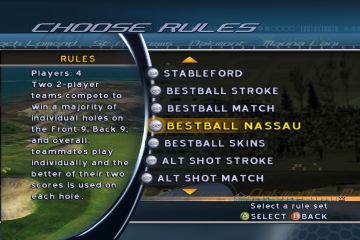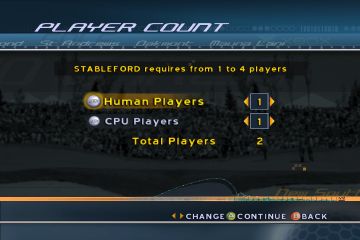Links 2004 Game Modes: Something for Everyone
By Keith Procter
One of the things I like most about Links 2004 is
its variety of game types. There are more ways to play XSN
Sports’ new golf game than you can shake a bag of clubs
at.
In the Single Round mode alone, there are 13 different ways
to challenge your video golfing skills. And there are two
other ways for a single player to compete on his or her Xbox
console, Career and Challenges, as well as the Multiplayer
games types available via System Link or Xbox Live.
That number of choices—enough to make your head spin like a
scalded slice—guarantees Links 2004 will have a
longer shelf life than irradiated milk.
In this article, I’ll focus on the game types available in
Single Round play. We’ll be adding stories soon about
competing in the Challenges and Career settings, as well as
the Multiplayer offerings.
Let’s start with my favorites, which are any of the three
types of Nassau games available with Links 2004: Nassau, which
is limited to two players; Bestball Nassau; and Alternate Shot
Nassau, which both require four players (two two-player teams,
using any combination of human or CPU players).

I’m particularly fond of the Nassau
modes.
A Nassau essentially is three match-play competitions in
one 18-hole round. Two players or two teams face off using
match-play rules, meaning the lowest score on each hole wins
that hole, which takes some of the pressure off hackers like
me. When I score a double-bogey or other unmentionable score
on a hole in a Nassau, it doesn’t ruin my entire round. The
damage is limited to the offending hole.
Here’s an example of how Nassau scoring works: Player A
wins the first three holes on the front nine but ties with his
opponent, Player B, on the remaining six holes. Player A would
win the front nine by 3-up or +3 (one point each for the holes
she or he won). On the back nine, let’s say Player B wins the
10th and 18th holes, while Player A wins only the 15th. They
post identical scores on the other holes, giving Player B the
win on back nine, 1-up. Player A would win when the overall
scores are compared because he won more holes over the course
of the round than Player B (2-up).
Nassau, especially the Bestball Nassau, became my favorite
this past Thanksgiving Day when my family gathered for
Thanksgiving dinner at my house. That’s when my 12-year-old
son and I played his teenaged cousins, an 18-year-old and a
16-year-old. The kids played the game for the first time that
afternoon, so they were all equal in skill and experience when
they challenged me to play with them after dessert.
The man of the match, though, was my son, Doug. He followed
a conservative game plan; while his older cousins and I always
tried to outdo each other off the tee and aimed every approach
for the flagstick, Doug took care to get his drives in the
fairway and often aimed for the center of the green. No blood
was drawn on the front side, but on the back side Doug was at
the top of his game, holing several long putts en route to
posting birdies on five of the final six holes. I couldn’t
have been prouder if I’d holed the putts myself. Even though I
went 3-over on the final six holes, thanks to Doug’s stellar
play we were able to take the back side and the match 4-up.
All of the Single Round games can be played with any
combination of human and CPU players. I suggest giving them
all a try. You’re sure to find one or two that strike a
chord.

Any combination of human and
computer-controlled players can take part.
SINGLE PLAYER GAMES
 Stroke (1 to 4 players): Standard
Stroke Play. One swing, one stroke.
Stroke (1 to 4 players): Standard
Stroke Play. One swing, one stroke.
 Match Play (2 players): Players
compete to win a majority of individual holes. The player with
the lowest score on each hole wins that hole.
Match Play (2 players): Players
compete to win a majority of individual holes. The player with
the lowest score on each hole wins that hole.
 Nassau (2 players): Similar to
Match Play, where two players compete to win a majority of
individual holes. It’s like three competitions in one round.
Players compete to win the Front Nine, Back Nine, and best
total for both nines.
Nassau (2 players): Similar to
Match Play, where two players compete to win a majority of
individual holes. It’s like three competitions in one round.
Players compete to win the Front Nine, Back Nine, and best
total for both nines.
 Skins (2 to 4 players): Players
compete to win Skins (one per hole, best outright score wins
the hole). Each skin is worth a set dollar value. If a hole is
tied for best score, the next hole is worth two skins, and so
on. The goal is to win the most holes (and the most
money).
Skins (2 to 4 players): Players
compete to win Skins (one per hole, best outright score wins
the hole). Each skin is worth a set dollar value. If a hole is
tied for best score, the next hole is worth two skins, and so
on. The goal is to win the most holes (and the most
money).
 Stableford (1 to 4 players): A
variation of Stroke Play that rewards risk-taking. Players are
awarded points for their score on a hole: you receive eight
points for double eagle, five for an eagle, two for birdie,
zero for par, -1 for bogey, and -3 for a double-bogey or
worse.
Stableford (1 to 4 players): A
variation of Stroke Play that rewards risk-taking. Players are
awarded points for their score on a hole: you receive eight
points for double eagle, five for an eagle, two for birdie,
zero for par, -1 for bogey, and -3 for a double-bogey or
worse.
 Bestball Stroke (4 players): Two
two-player teams compete in standard stroke play with both
teammates playing individually, using the better of their two
scores on each hole.
Bestball Stroke (4 players): Two
two-player teams compete in standard stroke play with both
teammates playing individually, using the better of their two
scores on each hole.
 Bestball Match (4 players): Two
two-player teams compete to win a majority of holes: Teammates
play individually and the better of their two scores is used
on each hole.
Bestball Match (4 players): Two
two-player teams compete to win a majority of holes: Teammates
play individually and the better of their two scores is used
on each hole.
 Bestball Nassau (4 players): Two
two-player teams compete to win a majority of holes on the
Front Nine, Back Nine, and total for 18: Teammates play
individually and the better of their scores is used on each
hole.
Bestball Nassau (4 players): Two
two-player teams compete to win a majority of holes on the
Front Nine, Back Nine, and total for 18: Teammates play
individually and the better of their scores is used on each
hole.
 Bestball Skins (4 players): Two
two-player teams compete to win the most money, with teammates
playing individually and using the better of their two scores
on each hole. Each hole is worth a skin. Tied holes carry
over.
Bestball Skins (4 players): Two
two-player teams compete to win the most money, with teammates
playing individually and using the better of their two scores
on each hole. Each hole is worth a skin. Tied holes carry
over.
 Alternate Shot Stroke (4 players):
Two two-player teams compete in standard stroke play with each
teammate taking every other shot.
Alternate Shot Stroke (4 players):
Two two-player teams compete in standard stroke play with each
teammate taking every other shot.
 Alternate Shot Match (4 players):
Two two-player teams compete to win a majority of individual
holes: each teammate takes every other shot.
Alternate Shot Match (4 players):
Two two-player teams compete to win a majority of individual
holes: each teammate takes every other shot.
 Alternate Shot Nassau (4 players):
Two two-player teams compete to win a majority of holes on the
Front Nine, the Back Nine, and overall: each teammate takes
every other shot.
Alternate Shot Nassau (4 players):
Two two-player teams compete to win a majority of holes on the
Front Nine, the Back Nine, and overall: each teammate takes
every other shot.
 Alternate Shot Skins (4 players):
Two two-player teams compete to win the most money, with each
teammate taking every other shot. Each hole is worth a skin.
If a hole is not won outright, the skin carries over to the
next hole.
Alternate Shot Skins (4 players):
Two two-player teams compete to win the most money, with each
teammate taking every other shot. Each hole is worth a skin.
If a hole is not won outright, the skin carries over to the
next hole.

